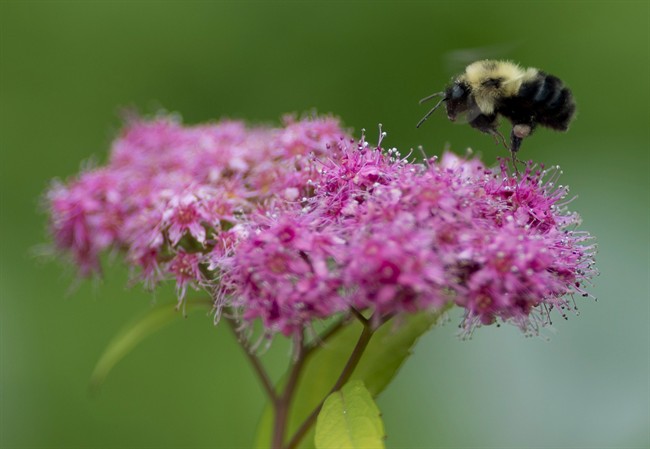More than half of samples of flowers bought in Canadian garden centres tested positive for neonicotinoids, a pesticide that many scientists say harms bees.

The recent study done by the environmental group Friends of the Earth showed 100 per cent of samples collected from one city, London, Ont., contained at least one neonicotinoid.
Lavender, geraniums and daisies were just some of the plants that Friends of the Earth found were treated with neonics when they tested plants in 18 cities across the U.S. and Canada, including Montreal, Vancouver and London. Overall, they found 51 per cent of total samples collected contained these neonicitonoids across North America.
“Most gardeners have no idea their gardens may be harmful to bees,” Beatrice Olivastri, Friends of the Earth Canada’s CEO, said in a press release. “Gardeners should buy organic plants to ensure the safety of bees.”
Friends of the Earth also said that most of the U.K.’s largest garden retailers voluntarily took garden products containing neonic off their shelves.
Now, Ontario’s agriculture ministry intends to restrict the use of neonicitonoids, making it the first provice in Canada to do so. The government will soon require farmers and other commercial growers to apply for permits, having a licensing system in place by the fall.
- Posters promoting ‘Steal From Loblaws Day’ are circulating. How did we get here?
- Video shows Ontario police sharing Trudeau’s location with protester, investigation launched
- Canadian food banks are on the brink: ‘This is not a sustainable situation’
- Solar eclipse eye damage: More than 160 cases reported in Ontario, Quebec
A story 16×9 originally aired last fall showed how one of the largest manufacturer of nenonics, Bayer CropScience, continues to sell Clothianidin, a pesticide used on millions of acres of crops, even though the company has yet to prove to regulators that it is safe for bees. Bayer is conducting a follow up study that it plans to submit to the U.S. Environmental Protection Agency and Canada’s Pest Management Regulatory Agency. Bayer also said that, when used properly, its product does not harm bees.
However, there is a growing consensus that neonics are hurting pollinators. The International Union for Conservation of Nature published a major study last month concluding neonicotinoids are a key factor in the dramatic decline of pollinator populations around the world. The study examined 800 peer-reviewed reports and found clear evidence of harm on pollinators from neonics “sufficient to trigger regulatory action.” Last year, The European Union temporarily halted the use of neonics.
U.S. President Barack Obama also recently recognized the need for immediate action in late June when he called for the creation of a Pollinator Health Task Force. It is mandated to establish a national strategy to protect pollinators.


Comments